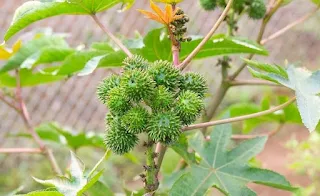How to Grow OhhSome Avanakku (Castor Plant) at Home
OhhSome Avanakku,
commonly known as the castor plant and scientifically called Ricinus
communis, is a hardy and fast-growing plant native to tropical and
subtropical regions. Widely used in traditional medicine, oil production,
and even as an ornamental shrub, it is cherished in rural homes across South
Asia, particularly in Tamil Nadu. If you have a backyard, rooftop
garden, or even a spacious balcony, you can successfully grow castor
(Avanakku) at home with the right care.
In this guide, we’ll explore how to grow OhhSome
Avanakku from seed to harvest and ensure a healthy plant for home remedies
and natural uses.
1. Understanding the Plant:
OhhSome Avanakku is a perennial shrub or small
tree that can grow up to 6–10 feet tall at home, depending on space and
conditions. It is known for its large, star-shaped leaves, spiky seed
pods, and red to purple stems. The seeds yield castor oil,
which is widely used for skin, hair, digestive, and joint health.
Warning: The seeds of the
plant contain ricin, a toxic compound if ingested. While the oil is
safe when properly extracted, always keep seeds and raw parts away from
children and pets.
2. Climate and Location:
Castor plants thrive in warm climates and need at
least 6–8 hours of sunlight daily.
- Ideal
Temperature: 20°C to 35°C
- Sunlight:
Full sun is essential
- Rainfall:
Moderate rainfall or regular watering
If you live in a cooler or rainy climate, grow the plant
during summer and early autumn.
3. Soil Preparation:
Avanakku prefers well-drained soil with moderate
fertility.
- Use
a mix of garden soil + compost + sand in a 2:1:1 ratio.
- The
soil should be loose and well-aerated.
- Add
organic compost or cow dung manure before planting to enrich the
soil.
Avoid waterlogged soil- it can cause root rot.
4. Planting from Seeds:
You can grow Avanakku easily from seeds, which are
available at garden centers or from mature pods.
Steps:
- Soak
seeds in water overnight to speed up germination.
- Plant
the seeds 1 inch deep in pots or ground beds.
- Space
each plant at least 2 to 3 feet apart for healthy growth.
- Germination
takes about 7 to 10 days in warm conditions.
5. Watering and Care:
- Watering:
Water the plant 2–3 times per week, depending on the weather. Reduce in
rainy conditions.
- Mulching:
Apply mulch around the base to retain moisture and prevent weed growth.
- Fertilizing:
Use organic fertilizers like compost or neem cake every 2–3 months
for better growth.
Once established, castor plants are drought-tolerant
but still appreciate occasional watering.
6. Pests and Diseases:
Castor is naturally resistant to many pests, but you may
encounter:
- Aphids
or mealy bugs- use neem oil spray.
- Root
rot- caused by overwatering.
Inspect plants weekly and maintain good air circulation
around them.
7. Harvesting Seeds and Leaves:
- Leaves
can be harvested after 2–3 months and used for home remedies like
joint pain poultices or wound healing.
- Seeds
are ready for harvest when the pods dry and turn brown (about 4–5
months after planting).
Use gloves when collecting the seeds to avoid contact
with ricin-containing pods. Dry the seeds well before storage.
8. Using the Plant?
After growing, you can use the Avanakku plant in several
ways:
- Leaves:
For poultices, skin inflammation, or as natural mulch.
- Oil:
Extract castor oil using cold-press methods (or buy food-grade oil and
store your seeds).
- Stem
and dried parts: Used for compost or firewood in some
rural areas.
Always label and store harvested seeds safely, away from
food or medicinal plants.
9. Growing in Containers:
If you lack garden space, castor plants can also grow in large
containers (at least 18–20 inches deep). Ensure proper drainage holes and
support the tall stem with a wooden stake if needed.
Conclusion:
Growing OhhSome Avanakku (castor plant) at home is
not only easy but also highly rewarding. Whether you use it for its medicinal
leaves, natural oil, or simply as a green ornamental plant,
it provides numerous benefits. With basic care, full sunlight, and responsible
handling, your castor plant can thrive and become a valuable addition to your
home garden.








0 Comments